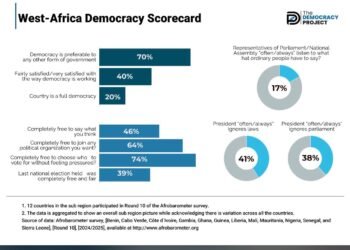Ghana’s population, as reported by the 2021 Population and Housing Census, stands at 31 million with an annual growth rate of 2.1 percent. This trajectory suggests that the population will double within the next 30 years, placing unprecedented pressure on the nation’s socio-economic and infrastructural capacities.
Former Chief Justice Georgina Theodora Wood has recently sounded the alarm on the potential socio-economic crisis facing Ghana due to its burgeoning population. Mrs. Wood emphasized this necessity during the launch of a thought-provoking book titled “From Human Resource to Human Capital: The Essence of Population Management” by Dr. Leticia Adelaide Appiah, the Executive Director of the National Population Council (NPC).
“This requires deliberate investments across multiple fronts, including social, educational, economic and infrastructural, to create the enabling environment where every individual could thrive and fulfill their God-given potential.”
Former Chief Justice Georgina Theodora Wood
Mrs. Wood expressed concern that without intervention, Ghana might reach a tipping point where its resources could no longer sustain its population’s needs.
Former Chief Justice Wood described this trend as a “population explosion,” which strains the nation’s socio-economic and infrastructural capacities. Without proactive measures, the implications of this growth trajectory could be dire.
One of the most critical areas requiring investment is education. As the population grows, so does the number of young people who will need access to quality education to prepare them for the future.
This involves not just increasing the number of schools and teachers, but also enhancing the quality of education through modern curricula, better training for educators, and the integration of technology in classrooms. By investing in education, Ghana can develop a skilled workforce capable of driving economic growth and innovation.
Economic investment, on the other hand, involves creating jobs and fostering an entrepreneurial spirit. This can be achieved through policies that encourage investment in key sectors such as agriculture, manufacturing, and services. Providing microloans and support for small and medium-sized enterprises (SMEs) can also empower individuals to contribute meaningfully to the economy.
Roadmap for the Future

Dr. Appiah’s book provides a comprehensive analysis of how Ghana can harness the potential of its population to ensure sustainable growth.
Drawing from her personal experience of growing up with about 50 siblings, Dr. Appiah advocates for a shift from viewing individuals as mere numbers to recognizing them as valuable human capital. Her book emphasizes the need for holistic investment in every child from cradle to college, ensuring that each individual can realize their potential.
“This book is not just a call to action; it is a roadmap for our future. May we collaboratively and productively work together across sectors and borders to ensure that every Ghanaian has the opportunity to thrive.”
Former Chief Justice Georgina Theodora Wood
A key aspect of Dr. Appiah’s vision is promoting sex and reproductive health information. This, she argues, is not about restricting freedom but about promoting health, dignity, peace, and prosperity. By destigmatizing population literacy and sexual health, communities can engage in open discussions that lead to informed decision-making and healthier lifestyles.
The central theme of Dr. Appiah’s book is the transition from viewing the population as merely a human resource to recognizing it as human capital. This perspective underscores the importance of investing in people to unlock their full potential.
As Mrs. Wood highlighted, empowering individuals to contribute meaningfully to the nation’s growth requires deliberate investments in social, educational, economic, and infrastructural domains.
Addressing the challenges posed by rapid population growth requires a collaborative approach. Government, private sector, civil society, and international partners must work together to implement comprehensive strategies that ensure sustainable development. This collective effort will help create a prosperous future where every Ghanaian has the opportunity to thrive.
Ghana’s rapid population growth presents both challenges and opportunities. By making deliberate investments in infrastructure, education, healthcare, and the economy, the country can harness the potential of its growing population to drive sustainable development.
As emphasized by thought leaders like former Chief Justice Georgina Theodora Wood and Dr. Leticia Adelaide Appiah, the time for action is now. With strategic planning and collaborative efforts, Ghana can build a future where all citizens can fulfill their potential and contribute to the nation’s prosperity.
READ ALSO: BoG Rebuts Claims of $8bn Loss Through Remittances























